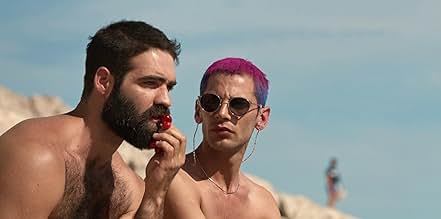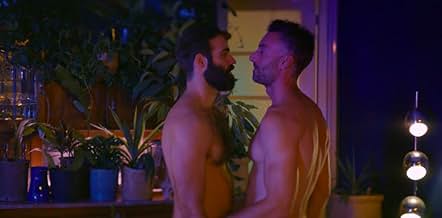AVALIAÇÃO DA IMDb
6,7/10
1,5 mil
SUA AVALIAÇÃO
Adicionar um enredo no seu idiomaWhile having a day-long swim at Athens' queer beach, best friends Demos and Nikitas recall the events of a recent summer in the prospect of turning them into a screenplay for Nikitas' featur... Ler tudoWhile having a day-long swim at Athens' queer beach, best friends Demos and Nikitas recall the events of a recent summer in the prospect of turning them into a screenplay for Nikitas' feature debut.While having a day-long swim at Athens' queer beach, best friends Demos and Nikitas recall the events of a recent summer in the prospect of turning them into a screenplay for Nikitas' feature debut.
- Direção
- Roteiristas
- Artistas
- Prêmios
- 4 vitórias e 16 indicações no total
- Direção
- Roteiristas
- Elenco e equipe completos
- Produção, bilheteria e muito mais no IMDbPro
Avaliações em destaque
The movie-within-a-movie narrative is a popular cinematic storytelling approach, but, to my knowledge, writer-director Zacharias Mavroeidis's fourth feature outing is the first film to make use of it in the LGBTQ+ genre. This endearing gay comedy-drama tells the story of two long-time best friends, Demosthenes (Yorgos Tsiantoulas), a former actor-turned civil servant, and Nikitas (Andreas Labropoulos), a former actor-turned aspiring filmmaker, who try to come up with a concept for the would-be auteur's latest movie project while hanging out together at a nude beach on the stunningly beautiful Greek seacoast. They toss around a variety of ideas, but they get the most traction out of a story and script based on the waning days of Demos's relationship with his former partner, Panos (Nikolaos Mikas), two summers earlier, a breakup for which Nikitas had a tolerance-testing front row seat. The events of that awkward, protracted separation are depicted here in a series of flashbacks in which the duo struggles to figure out where things went wrong and why, an examination that ultimately ends up revealing more about them as individuals than as a couple. In the process, the film presents a refreshingly authentic, often-revealing look at the dynamics of relationships and friendships among gay men, particularly when it comes to matters of honesty and commitment, both in and out of partnership contexts. And, along the way, the authors of this evolving production simultaneously look for ways to spice up their work, an exercise in inspired creativity, emboldened social activism, fiercely courageous self-acceptance, constrained moviemaking economics, challenging family relations and even benevolent pet care. However, the breadth of material presented in this story is, admittedly, a lot to skillfully massage into a coherent finished product. The filmmaker seems sincere enough in what he's trying to say, but he also comes across as somewhat inundated in trying to pull it all together into a neat and tidy package. To be sure, there are many earnest moments and flashes of brilliant humor here, but there's also a tendency to meander and a good deal of extraneous material that could have easily been deleted. This is perhaps most noticeable in the final act, where the momentum starts to sputter, almost as if the director doesn't quite know how to wrap things up. "The Summer with Carmen" truly represents an ambitious effort with decidedly mature, thoughtful sensibilities running throughout (arguably much more so than what one typically sees in many LGBTQ+ films), but it's also one that could have benefitted greatly from an editor unafraid to make the necessary cuts to allow it to shine as brightly as it might have.
This is an incredibly well-constructed movie, brimming with irony and following the tragic yet thought-provoking patterns reminiscent of ancient philosophers like Plato. The narrative subtly explores the complexities of human emotions, where the love between the main characters remains purely platonic, highlighting themes of connection beyond the physical.
A special mention goes to the dog, who delivered a surprisingly nuanced performance. Her presence is not just charming but integral to the plot, adding emotional depth and symbolizing loyalty and companionship in ways that enhance the storytelling.
The film's unique sense of humor stands out, masterfully blending subtle wit with a post-ironic visual narrative that keeps the audience engaged. This clever approach elevates the movie, offering layers of meaning that invite reflection long after the credits roll.
I give it an extra 100 out of 100 for its brilliance-both in its humor and innovative narrative structure. It's been over 100 minutes of pure cinematic delight, leaving me entertained and impressed in equal measure.
A special mention goes to the dog, who delivered a surprisingly nuanced performance. Her presence is not just charming but integral to the plot, adding emotional depth and symbolizing loyalty and companionship in ways that enhance the storytelling.
The film's unique sense of humor stands out, masterfully blending subtle wit with a post-ironic visual narrative that keeps the audience engaged. This clever approach elevates the movie, offering layers of meaning that invite reflection long after the credits roll.
I give it an extra 100 out of 100 for its brilliance-both in its humor and innovative narrative structure. It's been over 100 minutes of pure cinematic delight, leaving me entertained and impressed in equal measure.
If you watch an heap of gay cinema, especially from South America, then this kind of story isn't really that novel. There are plenty where hunky heroes like "Demos" (Yorgos Tsiantoilas) has a best mate "Nikitas" (Andreas Labropoulos) - who is obviously quite keen on his pal who doesn't really reciprocate in the way he wants, and who takes advantage of the local nudist beach and fairly vibrant gay community to get naked for much of the film and get down to some furious jogging with "Thymios" (Vasilis Tsigristaris) whilst on the rebound from a four year relationship with "Panos" (Nikolaos Mihas) with whom he looks after their dog "Carmen". Still with me? Well what now ensues is a rather predicable plot wrapped within the concept that the first two characters are thinking of writing a movie about this emotionally charged scenario. Along the way, there is plenty of soul-searching as just about everyone has to deal with their demons and hopefully emerge the better person. There's a much more continental-style dose of casual shagging that might raise eyebrows amongst those more used to a more Anglicised take on sex with subtle cutaways and perfectly placed pot plants (though it's not quite "Theo and Hugo" (2016) either). It's really a film about finding yourself and seeing what's squarely in front of you, but by using the film-making arc to give the audience a degree of observational objectiveness, it rather made me feel like a prurient fly on a wall where I didn't always belong (or care). The acting is natural and adequate, it's beautifully shot and there are plenty of rousing arias to enliven it, but I'm afraid I found it just a bit over-complicated and unoriginal.
I think one of the important things about this movie is how brave is. You must have balls to direct such scenes and also the actor to be comfortable to make them. Of course this is European movie. Wondering when the UK and America can do such movie without getting in trouble with the society.
Very well done. I wish more people see in cinema now in the UK. There were a few in there. I guess it's still a problem because of the subtitles.
Also i really liked the dialogues. Many people from the LGBTQ+ community can relate to that. Beautifully filmed and great locations chosen.
If you go back in time you will find great Greek movies.
Very well done. I wish more people see in cinema now in the UK. There were a few in there. I guess it's still a problem because of the subtitles.
Also i really liked the dialogues. Many people from the LGBTQ+ community can relate to that. Beautifully filmed and great locations chosen.
If you go back in time you will find great Greek movies.
When I started watching this movie, I thought, "An ordinary audience will probably think the film includes too much nudity." When I read the reviews, I realized I was right. However, this film doesn't actually contain excessive nudity. Instead, it portrays an aspect of gay culture. One of the most misguided judgments originating from a heterosexual mindset has always been the attempt to equate gay culture with heterosexual culture.
Yes, gays demand to be treated equally in society regarding rights and freedoms, and they are absolutely justified in this demand. The modern world has started to pave the way for equality, although there is still a long road ahead to achieve complete equality and freedom. However, we must understand that gay culture cannot be reduced to just a relationship between two people of the same sex. It is a broader concept that includes unique elements.
In gay culture, the way social life is lived may share similarities with heterosexuality, but the lifestyle demonstrates notable differences. For example, open relationships, orgies, and group dynamics are more widely accepted within gay culture than in heterosexual culture. Sexuality, rather than just sex, is a defining feature of gay culture and plays a crucial role in shaping identity.
Returning to the movie: yes, it features nudity, but this serves as a colorful element that adds cheerfulness and reminds viewers that the film stems from gay culture.
As for the movie itself, I liked it very much. Above all, experiencing Greece during the summertime made me feel wonderful. The actors-Yorgos Tsiantoulas (Demosthenes), Andreas Labropoulos (Nikitas), Nikolaos Mihas (Panos), Roubini Vasilakopoulou (Keti), Vasilis Tsigristaris (Thymios), and others-deliver outstanding performances. Their acting convinces us that they are as real as we are. The dialogues between the characters are relatable and innocent.
While the movie avoids diving deeply into melancholy, it provides a strong depiction of the characters' past experiences. The film's greatest success lies in its technique. The script and direction employ an innovative storytelling method. Flashbacks, typewritten notes, and structuring the film as a discussion of a movie scenario are completely fresh elements. For this, the director, Zacharias Mavroeidis (also the scriptwriter), and Fondas Chalatsis, the co-scriptwriter, deserve congratulations.
If you are a heterosexual viewer and find gay nudity disturbing, consider how many heterosexual nude scenes a gay audience sees in mainstream movies. Gay individuals endure many such scenes-not only in movies but also in commercials, magazines, TV shows, billboards, and daily life. Try to view it from their perspective.
Yes, gays demand to be treated equally in society regarding rights and freedoms, and they are absolutely justified in this demand. The modern world has started to pave the way for equality, although there is still a long road ahead to achieve complete equality and freedom. However, we must understand that gay culture cannot be reduced to just a relationship between two people of the same sex. It is a broader concept that includes unique elements.
In gay culture, the way social life is lived may share similarities with heterosexuality, but the lifestyle demonstrates notable differences. For example, open relationships, orgies, and group dynamics are more widely accepted within gay culture than in heterosexual culture. Sexuality, rather than just sex, is a defining feature of gay culture and plays a crucial role in shaping identity.
Returning to the movie: yes, it features nudity, but this serves as a colorful element that adds cheerfulness and reminds viewers that the film stems from gay culture.
As for the movie itself, I liked it very much. Above all, experiencing Greece during the summertime made me feel wonderful. The actors-Yorgos Tsiantoulas (Demosthenes), Andreas Labropoulos (Nikitas), Nikolaos Mihas (Panos), Roubini Vasilakopoulou (Keti), Vasilis Tsigristaris (Thymios), and others-deliver outstanding performances. Their acting convinces us that they are as real as we are. The dialogues between the characters are relatable and innocent.
While the movie avoids diving deeply into melancholy, it provides a strong depiction of the characters' past experiences. The film's greatest success lies in its technique. The script and direction employ an innovative storytelling method. Flashbacks, typewritten notes, and structuring the film as a discussion of a movie scenario are completely fresh elements. For this, the director, Zacharias Mavroeidis (also the scriptwriter), and Fondas Chalatsis, the co-scriptwriter, deserve congratulations.
If you are a heterosexual viewer and find gay nudity disturbing, consider how many heterosexual nude scenes a gay audience sees in mainstream movies. Gay individuals endure many such scenes-not only in movies but also in commercials, magazines, TV shows, billboards, and daily life. Try to view it from their perspective.
Você sabia?
- CuriosidadesThe golden rules of screenwriting listed in the film are: 1/ every movie has 3 acts 2/ every movie has a hero 3/ every hero has a goal 4/ every hero changes in pursuit of their goal
- Erros de gravaçãoAt the final scene you can see the boom mic at the bottom edge of the frame meanwhile Nikitas and Demosthenes have their last talk.
- ConexõesFeatures Washingtonia (2014)
Principais escolhas
Faça login para avaliar e ver a lista de recomendações personalizadas
- How long is The Summer with Carmen?Fornecido pela Alexa
Detalhes
- Data de lançamento
- País de origem
- Idioma
- Também conhecido como
- The Summer with Carmen
- Locações de filme
- Empresas de produção
- Consulte mais créditos da empresa na IMDbPro
Bilheteria
- Faturamento bruto mundial
- US$ 21.235
- Tempo de duração
- 1 h 46 min(106 min)
- Cor
- Proporção
- 1.85 : 1
Contribua para esta página
Sugerir uma alteração ou adicionar conteúdo ausente
































